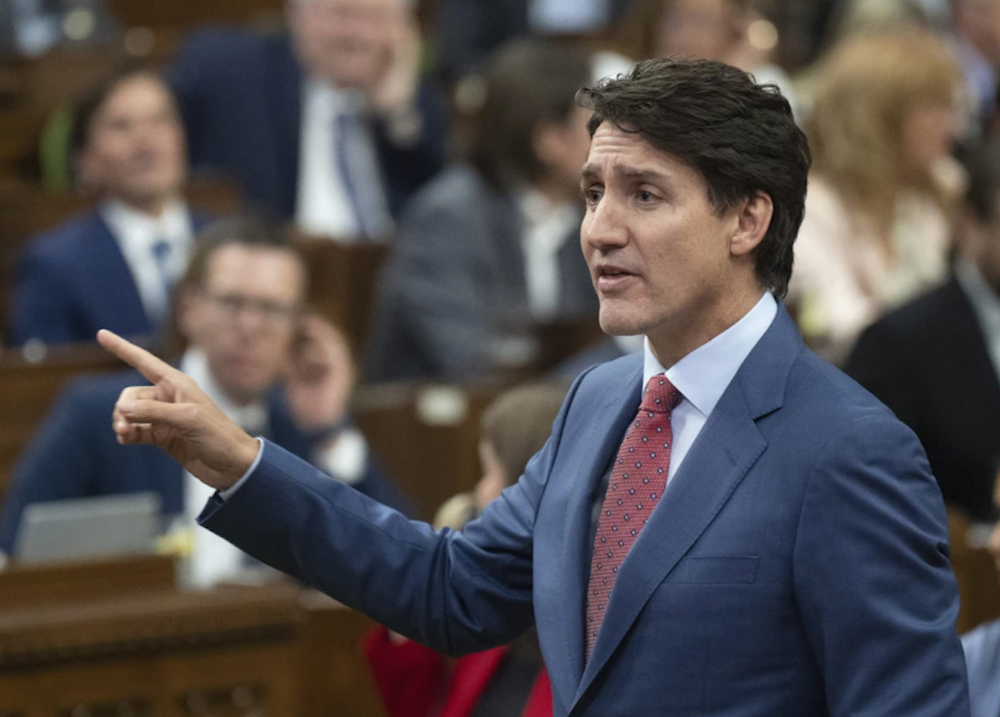Trudeau facing 'iceberg revolt' as more MPs demand he step down
The majority of Canada's Prime Ministers have left their positions through electoral defeat or when they've exhausted the possibility of winning.
-

Canadian Prime Minister Justin Trudeau responds to a question in Ottawa, on October 23, 2024. (AP)
Canadian Prime Minister Justin Trudeau is now attempting to defy the odds, and a furious population, to win his fourth term.
The Liberal party, angered by Trudeau, gave the prime minister an ultimatum: announce your decision regarding the possibility of remaining the party's leader or risk a caucus revolt.
During a closed-door meeting with Liberal lawmakers on Wednesday, 20 MPs, none of whom are cabinet members, urged Trudeau to step down ahead of what is expected to be a difficult election, The Guardian reported.
Two dozen lawmakers signed a letter demanding that Trudeau make his decision by October 28, though they did not specify any clear consequences if he does not.
The PM appeared unconcerned, and even told reporters last week that he had his party's support and any "robust conversations" about a future path "will happen as me as leader going into the next election."
Observers like Scott Reid, a political advisor and former director of communications to the former PM Paul Martin expressed that he was "likely shaken," knowing that other members may also desire to see his resignation and not have the courage to say so.
Reid described the situation as an "iceberg revolt," detailing how "What lurks beneath the waves could be vast, and that has got to be intimidating the prime minister, whether he admits it in public – or even in private.”
According to Reid, the majority of Canada's prime ministers have left their post through electoral defeat or "jumping at the very last moment when they've exhausted every possibility" of winning.
"The kind of person that believes in themselves enough to be the prime minister is exactly the kind of person who does not have any intention of leaving," according to Reid. "That's true of them all, and that is true of Justin Trudeau."
Trudeau a 'lightning rod' for discontent
Former Bank of England governor Mark Carney has hinted at a future leadership bid for the Liberal Party, while Foreign Minister Mélanie Joly and public safety minister Dominic LeBlanc are considered strong possibilities but have not openly shown interest. Any leadership campaign would struggle to exude vitality from an incumbent party approaching a decade in office.
Polling shows that much of the public's dissatisfaction with the government is focused on Trudeau, who has become a "lightning rod" for discontent, Reid says.
The CBC poll tracker shows the Liberals trailing the Conservatives by over 20 points, a historically low showing. Political analyst Éric Grenier adds that this decrease is not the result of a single incident, but rather the cumulative effect of nearly a decade in power, with many people already having definite opinions about Trudeau that are hard to alter.
The Liberals are facing pressure from the Bloc Québécois, which threatened to topple Trudeau’s minority government over unmet demands to increase old age security payments for seniors. Bloc leader Yves-François Blanchet warned that Trudeau’s “days are numbered.” The Bloc can now coordinate with opposition parties to potentially force an election.
Political analyst Éric Grenier noted, “Trying to get re-elected three times in a row as the same leader is not easy. Trying to do it four times – that’s historically difficult to do,” highlighting that the last politician to achieve this was Wilfrid Laurier in 1908.

 4 Min Read
4 Min Read








